Challenges in Gathering Reliable Information: Philippines Market
VerifiedAdded on 2022/09/09
|9
|2015
|21
Report
AI Summary
This report provides an in-depth analysis of the challenges faced by businesses seeking to expand their operations in the Philippines, an emerging and developing market economy (EDME). The report emphasizes the importance of reliable market information for effective decision-making and strategy development. It identifies three key challenges: difficulties in information and communication technology (ICT), cultural differences between countries, and the reliability of primary and secondary data sources. The report discusses the risks these challenges pose to business operations and suggests various methods to mitigate them, including improvements in ICT infrastructure, cultural training, and rigorous data verification. The report concludes by highlighting the significance of addressing these challenges to ensure successful international business ventures in the Philippines.
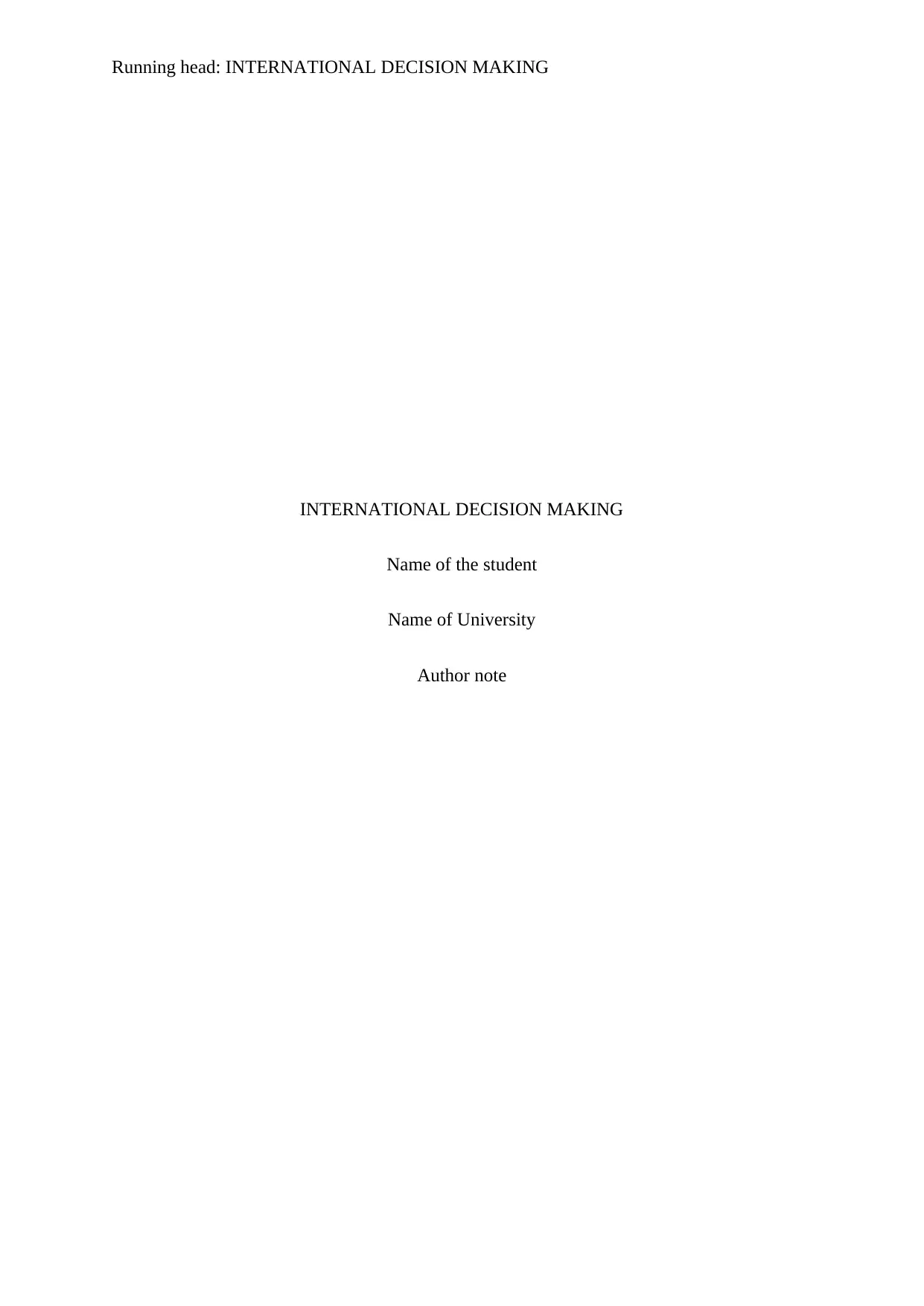
Running head: INTERNATIONAL DECISION MAKING
INTERNATIONAL DECISION MAKING
Name of the student
Name of University
Author note
INTERNATIONAL DECISION MAKING
Name of the student
Name of University
Author note
Paraphrase This Document
Need a fresh take? Get an instant paraphrase of this document with our AI Paraphraser
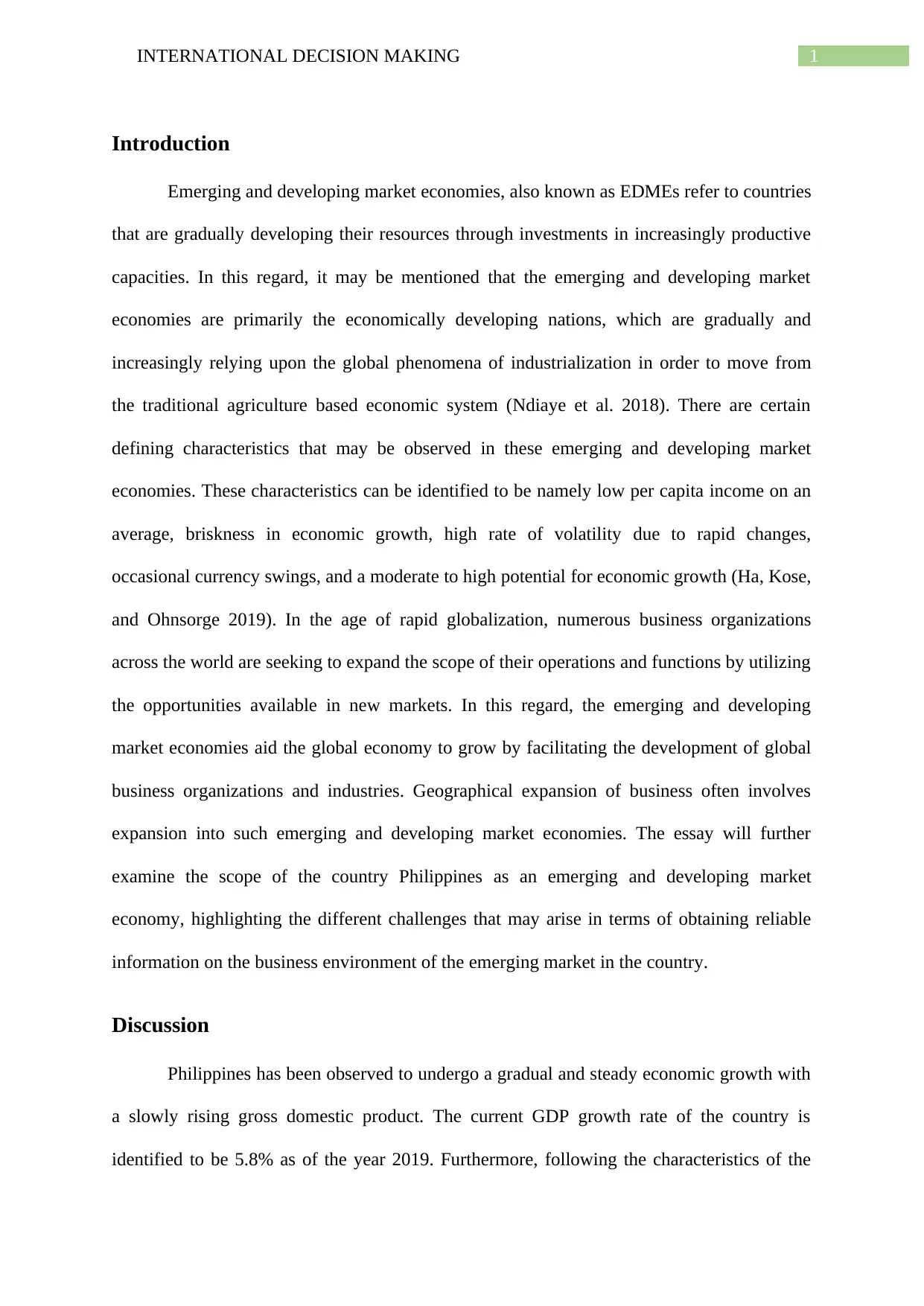
1INTERNATIONAL DECISION MAKING
Introduction
Emerging and developing market economies, also known as EDMEs refer to countries
that are gradually developing their resources through investments in increasingly productive
capacities. In this regard, it may be mentioned that the emerging and developing market
economies are primarily the economically developing nations, which are gradually and
increasingly relying upon the global phenomena of industrialization in order to move from
the traditional agriculture based economic system (Ndiaye et al. 2018). There are certain
defining characteristics that may be observed in these emerging and developing market
economies. These characteristics can be identified to be namely low per capita income on an
average, briskness in economic growth, high rate of volatility due to rapid changes,
occasional currency swings, and a moderate to high potential for economic growth (Ha, Kose,
and Ohnsorge 2019). In the age of rapid globalization, numerous business organizations
across the world are seeking to expand the scope of their operations and functions by utilizing
the opportunities available in new markets. In this regard, the emerging and developing
market economies aid the global economy to grow by facilitating the development of global
business organizations and industries. Geographical expansion of business often involves
expansion into such emerging and developing market economies. The essay will further
examine the scope of the country Philippines as an emerging and developing market
economy, highlighting the different challenges that may arise in terms of obtaining reliable
information on the business environment of the emerging market in the country.
Discussion
Philippines has been observed to undergo a gradual and steady economic growth with
a slowly rising gross domestic product. The current GDP growth rate of the country is
identified to be 5.8% as of the year 2019. Furthermore, following the characteristics of the
Introduction
Emerging and developing market economies, also known as EDMEs refer to countries
that are gradually developing their resources through investments in increasingly productive
capacities. In this regard, it may be mentioned that the emerging and developing market
economies are primarily the economically developing nations, which are gradually and
increasingly relying upon the global phenomena of industrialization in order to move from
the traditional agriculture based economic system (Ndiaye et al. 2018). There are certain
defining characteristics that may be observed in these emerging and developing market
economies. These characteristics can be identified to be namely low per capita income on an
average, briskness in economic growth, high rate of volatility due to rapid changes,
occasional currency swings, and a moderate to high potential for economic growth (Ha, Kose,
and Ohnsorge 2019). In the age of rapid globalization, numerous business organizations
across the world are seeking to expand the scope of their operations and functions by utilizing
the opportunities available in new markets. In this regard, the emerging and developing
market economies aid the global economy to grow by facilitating the development of global
business organizations and industries. Geographical expansion of business often involves
expansion into such emerging and developing market economies. The essay will further
examine the scope of the country Philippines as an emerging and developing market
economy, highlighting the different challenges that may arise in terms of obtaining reliable
information on the business environment of the emerging market in the country.
Discussion
Philippines has been observed to undergo a gradual and steady economic growth with
a slowly rising gross domestic product. The current GDP growth rate of the country is
identified to be 5.8% as of the year 2019. Furthermore, following the characteristics of the
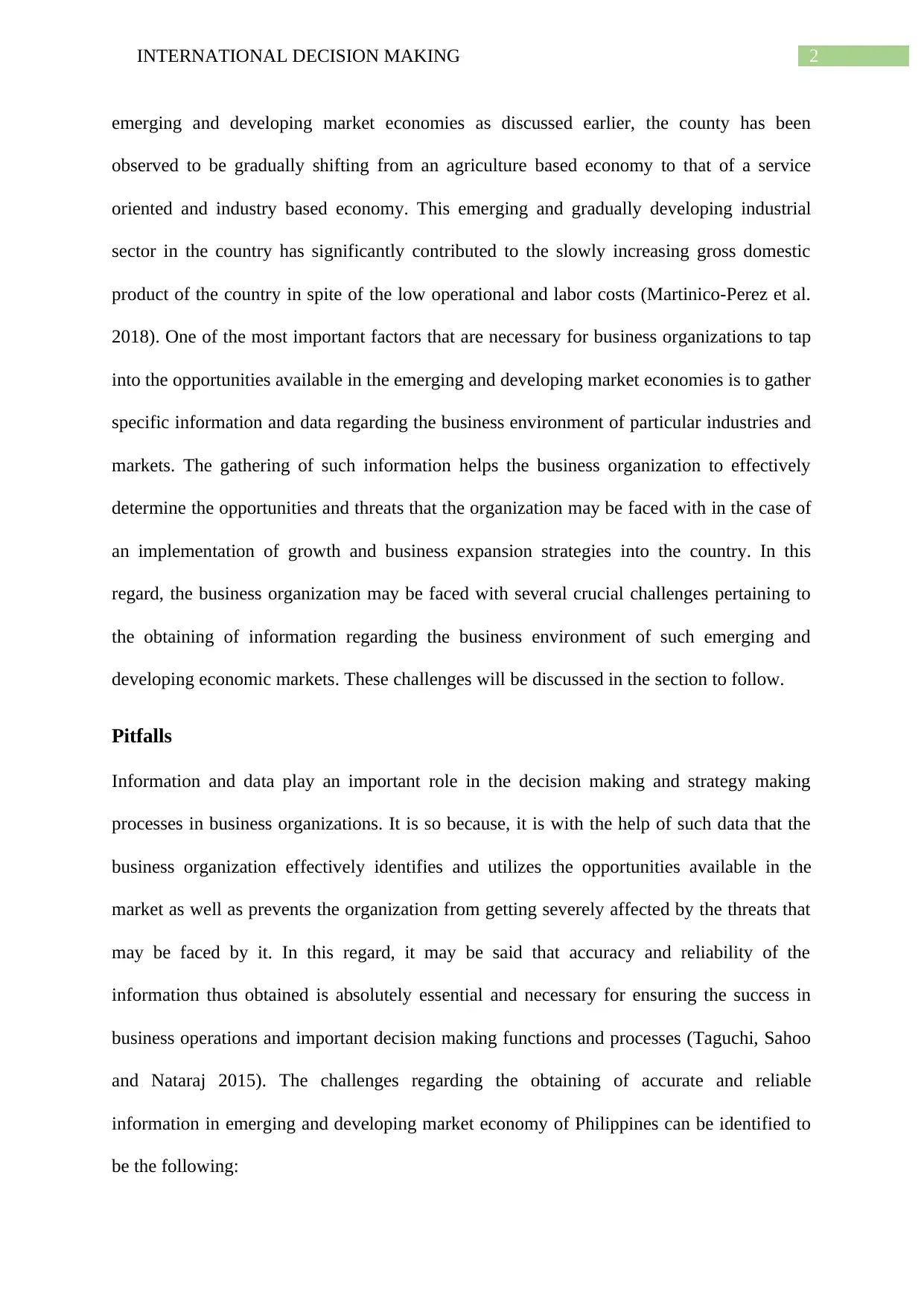
2INTERNATIONAL DECISION MAKING
emerging and developing market economies as discussed earlier, the county has been
observed to be gradually shifting from an agriculture based economy to that of a service
oriented and industry based economy. This emerging and gradually developing industrial
sector in the country has significantly contributed to the slowly increasing gross domestic
product of the country in spite of the low operational and labor costs (Martinico-Perez et al.
2018). One of the most important factors that are necessary for business organizations to tap
into the opportunities available in the emerging and developing market economies is to gather
specific information and data regarding the business environment of particular industries and
markets. The gathering of such information helps the business organization to effectively
determine the opportunities and threats that the organization may be faced with in the case of
an implementation of growth and business expansion strategies into the country. In this
regard, the business organization may be faced with several crucial challenges pertaining to
the obtaining of information regarding the business environment of such emerging and
developing economic markets. These challenges will be discussed in the section to follow.
Pitfalls
Information and data play an important role in the decision making and strategy making
processes in business organizations. It is so because, it is with the help of such data that the
business organization effectively identifies and utilizes the opportunities available in the
market as well as prevents the organization from getting severely affected by the threats that
may be faced by it. In this regard, it may be said that accuracy and reliability of the
information thus obtained is absolutely essential and necessary for ensuring the success in
business operations and important decision making functions and processes (Taguchi, Sahoo
and Nataraj 2015). The challenges regarding the obtaining of accurate and reliable
information in emerging and developing market economy of Philippines can be identified to
be the following:
emerging and developing market economies as discussed earlier, the county has been
observed to be gradually shifting from an agriculture based economy to that of a service
oriented and industry based economy. This emerging and gradually developing industrial
sector in the country has significantly contributed to the slowly increasing gross domestic
product of the country in spite of the low operational and labor costs (Martinico-Perez et al.
2018). One of the most important factors that are necessary for business organizations to tap
into the opportunities available in the emerging and developing market economies is to gather
specific information and data regarding the business environment of particular industries and
markets. The gathering of such information helps the business organization to effectively
determine the opportunities and threats that the organization may be faced with in the case of
an implementation of growth and business expansion strategies into the country. In this
regard, the business organization may be faced with several crucial challenges pertaining to
the obtaining of information regarding the business environment of such emerging and
developing economic markets. These challenges will be discussed in the section to follow.
Pitfalls
Information and data play an important role in the decision making and strategy making
processes in business organizations. It is so because, it is with the help of such data that the
business organization effectively identifies and utilizes the opportunities available in the
market as well as prevents the organization from getting severely affected by the threats that
may be faced by it. In this regard, it may be said that accuracy and reliability of the
information thus obtained is absolutely essential and necessary for ensuring the success in
business operations and important decision making functions and processes (Taguchi, Sahoo
and Nataraj 2015). The challenges regarding the obtaining of accurate and reliable
information in emerging and developing market economy of Philippines can be identified to
be the following:
⊘ This is a preview!⊘
Do you want full access?
Subscribe today to unlock all pages.

Trusted by 1+ million students worldwide
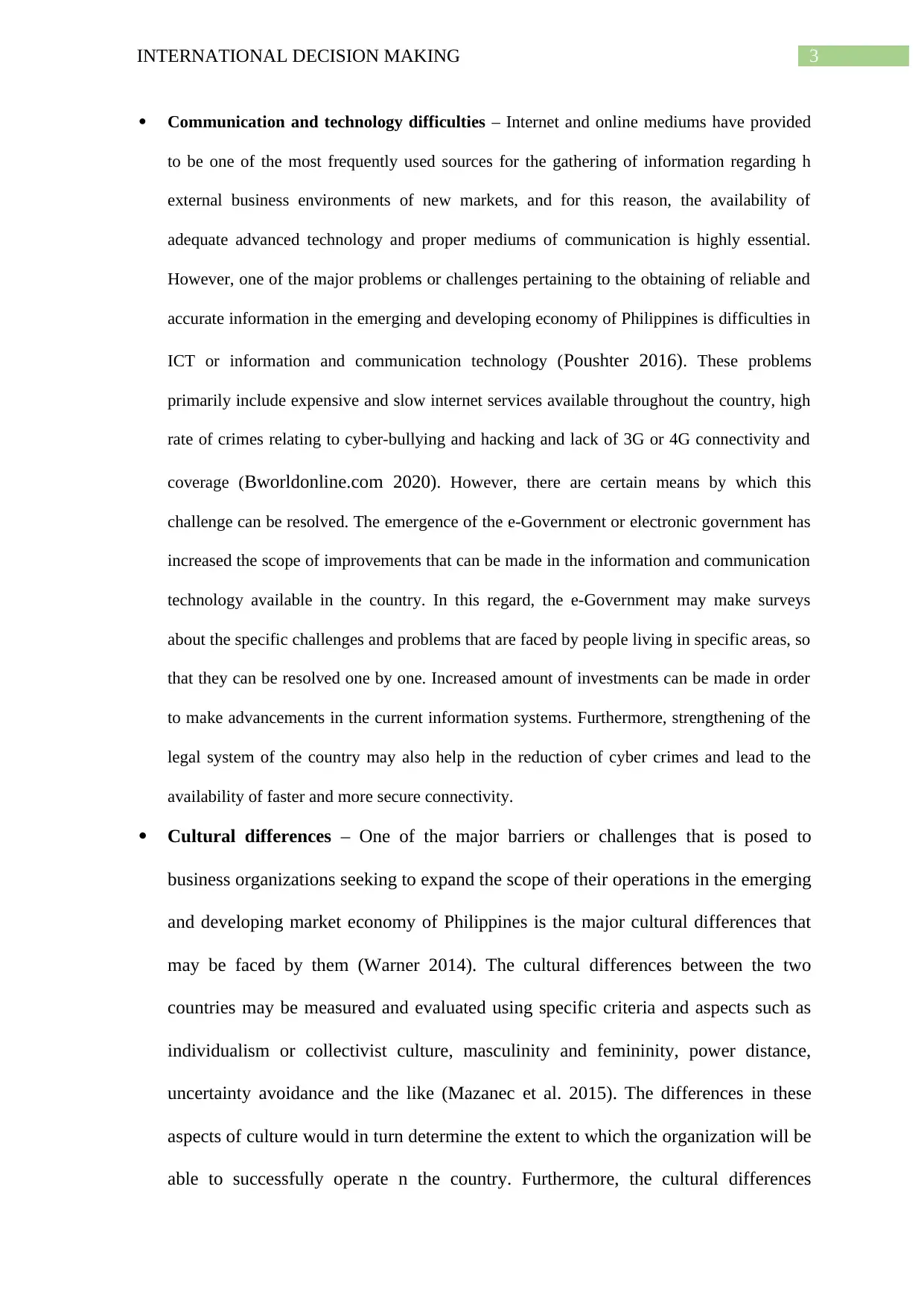
3INTERNATIONAL DECISION MAKING
Communication and technology difficulties – Internet and online mediums have provided
to be one of the most frequently used sources for the gathering of information regarding h
external business environments of new markets, and for this reason, the availability of
adequate advanced technology and proper mediums of communication is highly essential.
However, one of the major problems or challenges pertaining to the obtaining of reliable and
accurate information in the emerging and developing economy of Philippines is difficulties in
ICT or information and communication technology (Poushter 2016). These problems
primarily include expensive and slow internet services available throughout the country, high
rate of crimes relating to cyber-bullying and hacking and lack of 3G or 4G connectivity and
coverage (Bworldonline.com 2020). However, there are certain means by which this
challenge can be resolved. The emergence of the e-Government or electronic government has
increased the scope of improvements that can be made in the information and communication
technology available in the country. In this regard, the e-Government may make surveys
about the specific challenges and problems that are faced by people living in specific areas, so
that they can be resolved one by one. Increased amount of investments can be made in order
to make advancements in the current information systems. Furthermore, strengthening of the
legal system of the country may also help in the reduction of cyber crimes and lead to the
availability of faster and more secure connectivity.
Cultural differences – One of the major barriers or challenges that is posed to
business organizations seeking to expand the scope of their operations in the emerging
and developing market economy of Philippines is the major cultural differences that
may be faced by them (Warner 2014). The cultural differences between the two
countries may be measured and evaluated using specific criteria and aspects such as
individualism or collectivist culture, masculinity and femininity, power distance,
uncertainty avoidance and the like (Mazanec et al. 2015). The differences in these
aspects of culture would in turn determine the extent to which the organization will be
able to successfully operate n the country. Furthermore, the cultural differences
Communication and technology difficulties – Internet and online mediums have provided
to be one of the most frequently used sources for the gathering of information regarding h
external business environments of new markets, and for this reason, the availability of
adequate advanced technology and proper mediums of communication is highly essential.
However, one of the major problems or challenges pertaining to the obtaining of reliable and
accurate information in the emerging and developing economy of Philippines is difficulties in
ICT or information and communication technology (Poushter 2016). These problems
primarily include expensive and slow internet services available throughout the country, high
rate of crimes relating to cyber-bullying and hacking and lack of 3G or 4G connectivity and
coverage (Bworldonline.com 2020). However, there are certain means by which this
challenge can be resolved. The emergence of the e-Government or electronic government has
increased the scope of improvements that can be made in the information and communication
technology available in the country. In this regard, the e-Government may make surveys
about the specific challenges and problems that are faced by people living in specific areas, so
that they can be resolved one by one. Increased amount of investments can be made in order
to make advancements in the current information systems. Furthermore, strengthening of the
legal system of the country may also help in the reduction of cyber crimes and lead to the
availability of faster and more secure connectivity.
Cultural differences – One of the major barriers or challenges that is posed to
business organizations seeking to expand the scope of their operations in the emerging
and developing market economy of Philippines is the major cultural differences that
may be faced by them (Warner 2014). The cultural differences between the two
countries may be measured and evaluated using specific criteria and aspects such as
individualism or collectivist culture, masculinity and femininity, power distance,
uncertainty avoidance and the like (Mazanec et al. 2015). The differences in these
aspects of culture would in turn determine the extent to which the organization will be
able to successfully operate n the country. Furthermore, the cultural differences
Paraphrase This Document
Need a fresh take? Get an instant paraphrase of this document with our AI Paraphraser
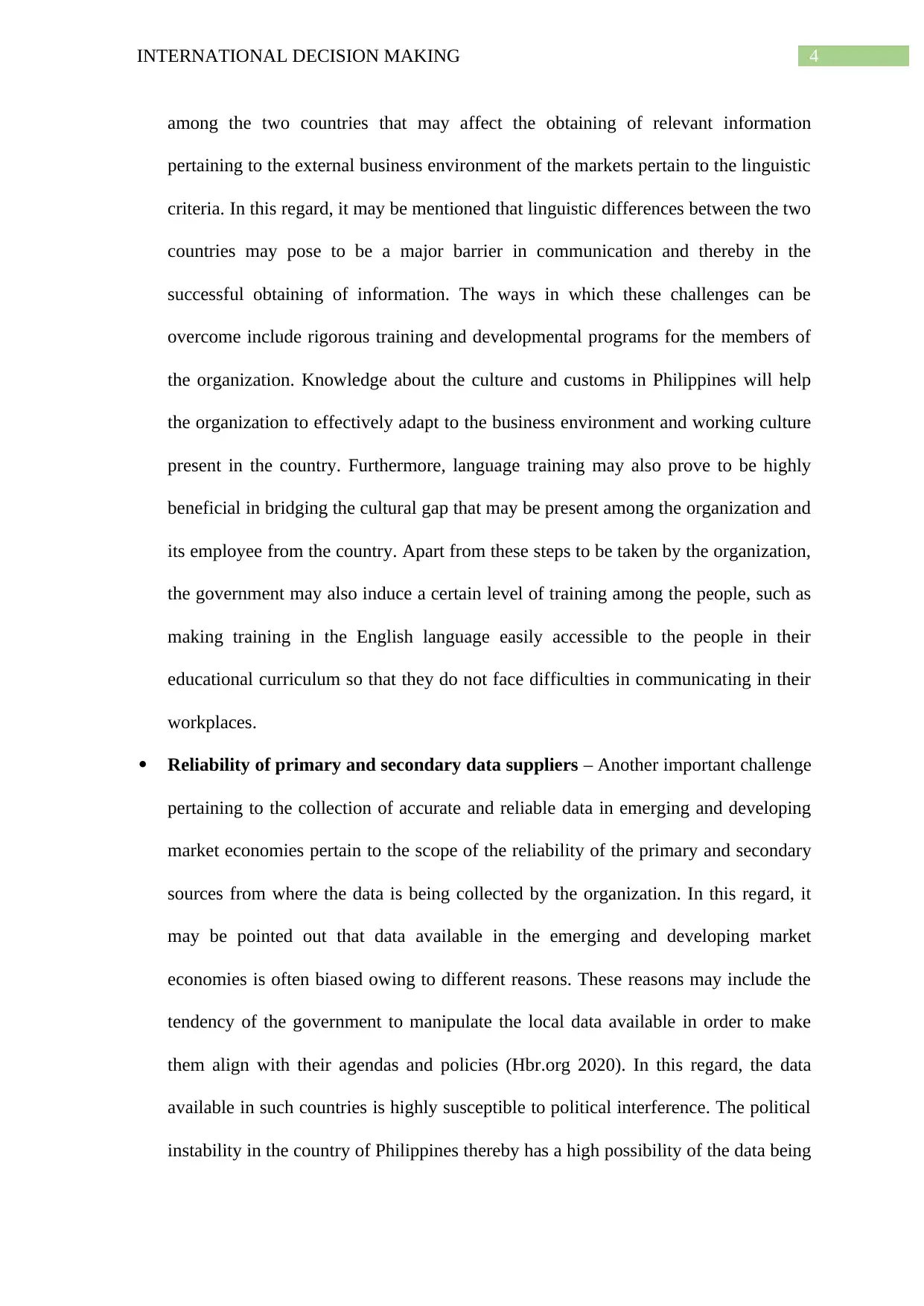
4INTERNATIONAL DECISION MAKING
among the two countries that may affect the obtaining of relevant information
pertaining to the external business environment of the markets pertain to the linguistic
criteria. In this regard, it may be mentioned that linguistic differences between the two
countries may pose to be a major barrier in communication and thereby in the
successful obtaining of information. The ways in which these challenges can be
overcome include rigorous training and developmental programs for the members of
the organization. Knowledge about the culture and customs in Philippines will help
the organization to effectively adapt to the business environment and working culture
present in the country. Furthermore, language training may also prove to be highly
beneficial in bridging the cultural gap that may be present among the organization and
its employee from the country. Apart from these steps to be taken by the organization,
the government may also induce a certain level of training among the people, such as
making training in the English language easily accessible to the people in their
educational curriculum so that they do not face difficulties in communicating in their
workplaces.
Reliability of primary and secondary data suppliers – Another important challenge
pertaining to the collection of accurate and reliable data in emerging and developing
market economies pertain to the scope of the reliability of the primary and secondary
sources from where the data is being collected by the organization. In this regard, it
may be pointed out that data available in the emerging and developing market
economies is often biased owing to different reasons. These reasons may include the
tendency of the government to manipulate the local data available in order to make
them align with their agendas and policies (Hbr.org 2020). In this regard, the data
available in such countries is highly susceptible to political interference. The political
instability in the country of Philippines thereby has a high possibility of the data being
among the two countries that may affect the obtaining of relevant information
pertaining to the external business environment of the markets pertain to the linguistic
criteria. In this regard, it may be mentioned that linguistic differences between the two
countries may pose to be a major barrier in communication and thereby in the
successful obtaining of information. The ways in which these challenges can be
overcome include rigorous training and developmental programs for the members of
the organization. Knowledge about the culture and customs in Philippines will help
the organization to effectively adapt to the business environment and working culture
present in the country. Furthermore, language training may also prove to be highly
beneficial in bridging the cultural gap that may be present among the organization and
its employee from the country. Apart from these steps to be taken by the organization,
the government may also induce a certain level of training among the people, such as
making training in the English language easily accessible to the people in their
educational curriculum so that they do not face difficulties in communicating in their
workplaces.
Reliability of primary and secondary data suppliers – Another important challenge
pertaining to the collection of accurate and reliable data in emerging and developing
market economies pertain to the scope of the reliability of the primary and secondary
sources from where the data is being collected by the organization. In this regard, it
may be pointed out that data available in the emerging and developing market
economies is often biased owing to different reasons. These reasons may include the
tendency of the government to manipulate the local data available in order to make
them align with their agendas and policies (Hbr.org 2020). In this regard, the data
available in such countries is highly susceptible to political interference. The political
instability in the country of Philippines thereby has a high possibility of the data being
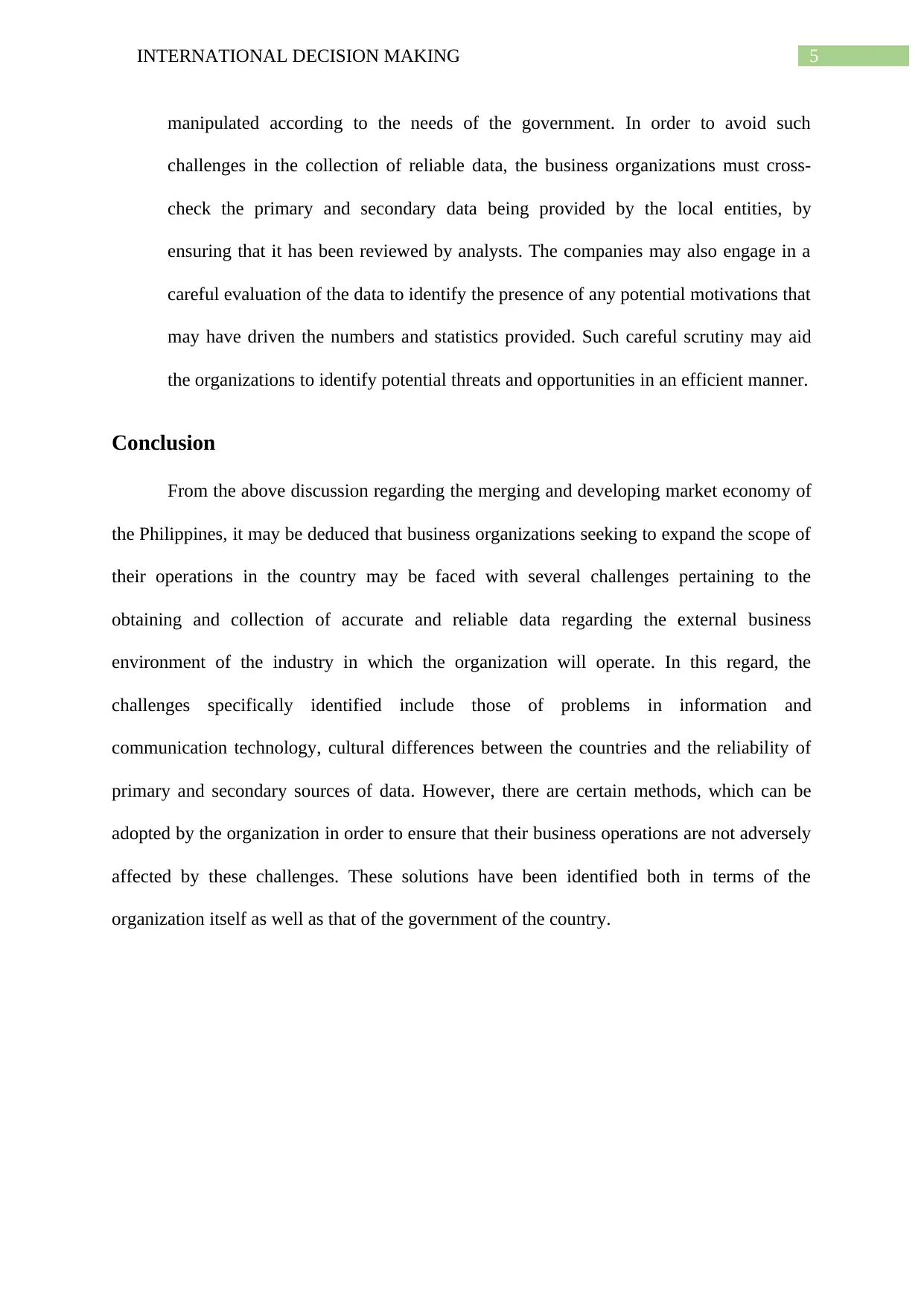
5INTERNATIONAL DECISION MAKING
manipulated according to the needs of the government. In order to avoid such
challenges in the collection of reliable data, the business organizations must cross-
check the primary and secondary data being provided by the local entities, by
ensuring that it has been reviewed by analysts. The companies may also engage in a
careful evaluation of the data to identify the presence of any potential motivations that
may have driven the numbers and statistics provided. Such careful scrutiny may aid
the organizations to identify potential threats and opportunities in an efficient manner.
Conclusion
From the above discussion regarding the merging and developing market economy of
the Philippines, it may be deduced that business organizations seeking to expand the scope of
their operations in the country may be faced with several challenges pertaining to the
obtaining and collection of accurate and reliable data regarding the external business
environment of the industry in which the organization will operate. In this regard, the
challenges specifically identified include those of problems in information and
communication technology, cultural differences between the countries and the reliability of
primary and secondary sources of data. However, there are certain methods, which can be
adopted by the organization in order to ensure that their business operations are not adversely
affected by these challenges. These solutions have been identified both in terms of the
organization itself as well as that of the government of the country.
manipulated according to the needs of the government. In order to avoid such
challenges in the collection of reliable data, the business organizations must cross-
check the primary and secondary data being provided by the local entities, by
ensuring that it has been reviewed by analysts. The companies may also engage in a
careful evaluation of the data to identify the presence of any potential motivations that
may have driven the numbers and statistics provided. Such careful scrutiny may aid
the organizations to identify potential threats and opportunities in an efficient manner.
Conclusion
From the above discussion regarding the merging and developing market economy of
the Philippines, it may be deduced that business organizations seeking to expand the scope of
their operations in the country may be faced with several challenges pertaining to the
obtaining and collection of accurate and reliable data regarding the external business
environment of the industry in which the organization will operate. In this regard, the
challenges specifically identified include those of problems in information and
communication technology, cultural differences between the countries and the reliability of
primary and secondary sources of data. However, there are certain methods, which can be
adopted by the organization in order to ensure that their business operations are not adversely
affected by these challenges. These solutions have been identified both in terms of the
organization itself as well as that of the government of the country.
⊘ This is a preview!⊘
Do you want full access?
Subscribe today to unlock all pages.

Trusted by 1+ million students worldwide
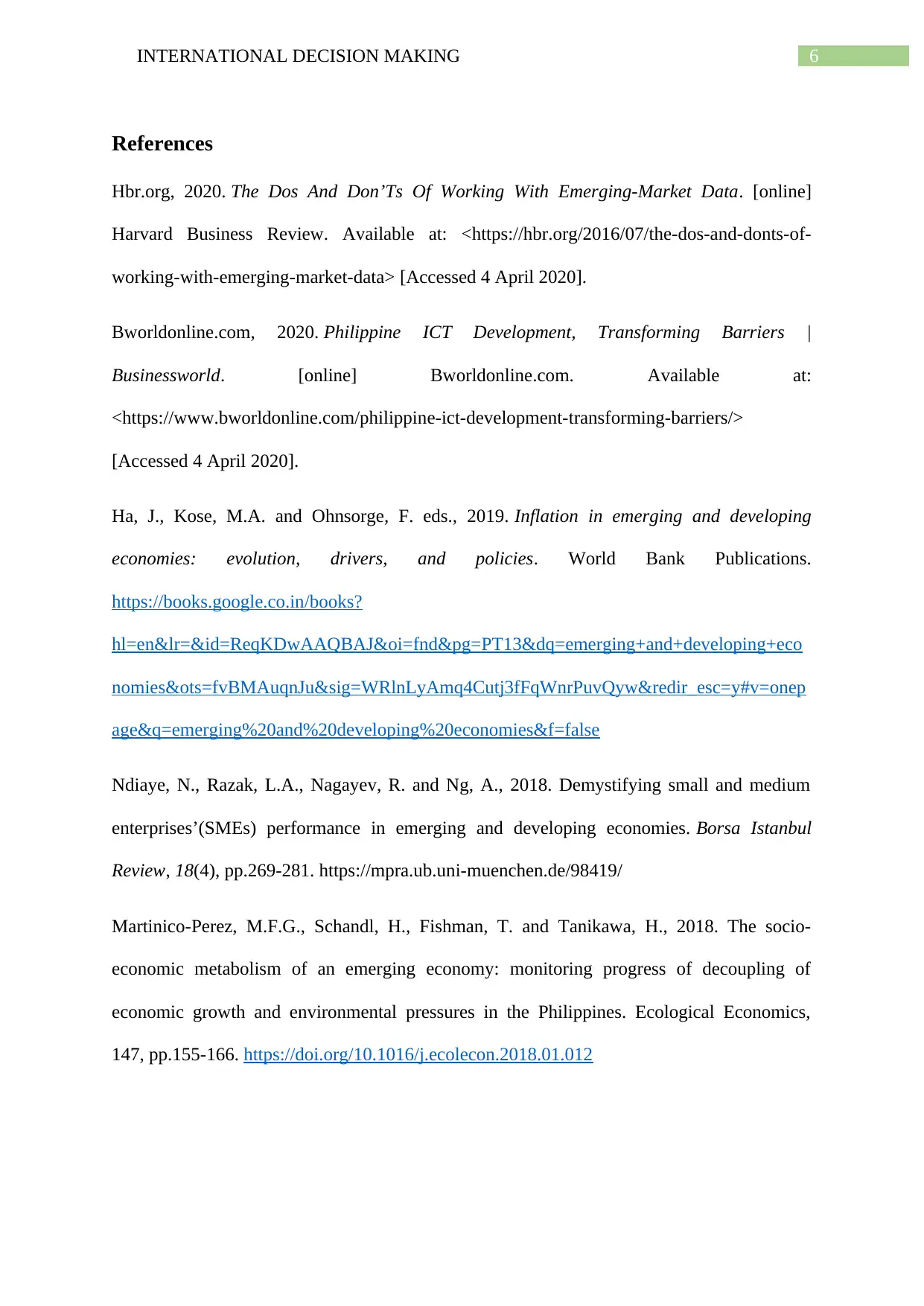
6INTERNATIONAL DECISION MAKING
References
Hbr.org, 2020. The Dos And Don’Ts Of Working With Emerging-Market Data. [online]
Harvard Business Review. Available at: <https://hbr.org/2016/07/the-dos-and-donts-of-
working-with-emerging-market-data> [Accessed 4 April 2020].
Bworldonline.com, 2020. Philippine ICT Development, Transforming Barriers |
Businessworld. [online] Bworldonline.com. Available at:
<https://www.bworldonline.com/philippine-ict-development-transforming-barriers/>
[Accessed 4 April 2020].
Ha, J., Kose, M.A. and Ohnsorge, F. eds., 2019. Inflation in emerging and developing
economies: evolution, drivers, and policies. World Bank Publications.
https://books.google.co.in/books?
hl=en&lr=&id=ReqKDwAAQBAJ&oi=fnd&pg=PT13&dq=emerging+and+developing+eco
nomies&ots=fvBMAuqnJu&sig=WRlnLyAmq4Cutj3fFqWnrPuvQyw&redir_esc=y#v=onep
age&q=emerging%20and%20developing%20economies&f=false
Ndiaye, N., Razak, L.A., Nagayev, R. and Ng, A., 2018. Demystifying small and medium
enterprises’(SMEs) performance in emerging and developing economies. Borsa Istanbul
Review, 18(4), pp.269-281. https://mpra.ub.uni-muenchen.de/98419/
Martinico-Perez, M.F.G., Schandl, H., Fishman, T. and Tanikawa, H., 2018. The socio-
economic metabolism of an emerging economy: monitoring progress of decoupling of
economic growth and environmental pressures in the Philippines. Ecological Economics,
147, pp.155-166. https://doi.org/10.1016/j.ecolecon.2018.01.012
References
Hbr.org, 2020. The Dos And Don’Ts Of Working With Emerging-Market Data. [online]
Harvard Business Review. Available at: <https://hbr.org/2016/07/the-dos-and-donts-of-
working-with-emerging-market-data> [Accessed 4 April 2020].
Bworldonline.com, 2020. Philippine ICT Development, Transforming Barriers |
Businessworld. [online] Bworldonline.com. Available at:
<https://www.bworldonline.com/philippine-ict-development-transforming-barriers/>
[Accessed 4 April 2020].
Ha, J., Kose, M.A. and Ohnsorge, F. eds., 2019. Inflation in emerging and developing
economies: evolution, drivers, and policies. World Bank Publications.
https://books.google.co.in/books?
hl=en&lr=&id=ReqKDwAAQBAJ&oi=fnd&pg=PT13&dq=emerging+and+developing+eco
nomies&ots=fvBMAuqnJu&sig=WRlnLyAmq4Cutj3fFqWnrPuvQyw&redir_esc=y#v=onep
age&q=emerging%20and%20developing%20economies&f=false
Ndiaye, N., Razak, L.A., Nagayev, R. and Ng, A., 2018. Demystifying small and medium
enterprises’(SMEs) performance in emerging and developing economies. Borsa Istanbul
Review, 18(4), pp.269-281. https://mpra.ub.uni-muenchen.de/98419/
Martinico-Perez, M.F.G., Schandl, H., Fishman, T. and Tanikawa, H., 2018. The socio-
economic metabolism of an emerging economy: monitoring progress of decoupling of
economic growth and environmental pressures in the Philippines. Ecological Economics,
147, pp.155-166. https://doi.org/10.1016/j.ecolecon.2018.01.012
Paraphrase This Document
Need a fresh take? Get an instant paraphrase of this document with our AI Paraphraser
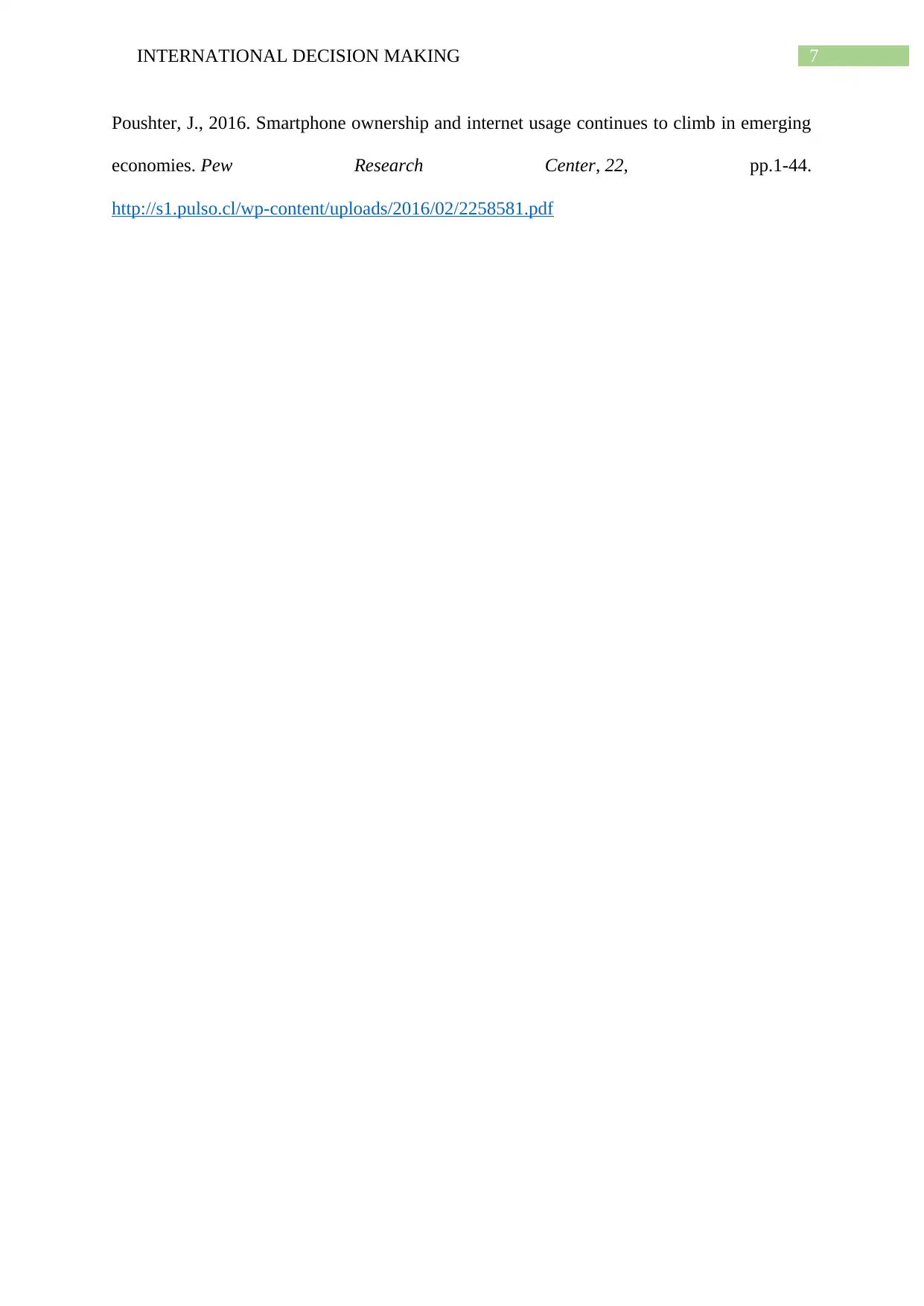
7INTERNATIONAL DECISION MAKING
Poushter, J., 2016. Smartphone ownership and internet usage continues to climb in emerging
economies. Pew Research Center, 22, pp.1-44.
http://s1.pulso.cl/wp-content/uploads/2016/02/2258581.pdf
Poushter, J., 2016. Smartphone ownership and internet usage continues to climb in emerging
economies. Pew Research Center, 22, pp.1-44.
http://s1.pulso.cl/wp-content/uploads/2016/02/2258581.pdf
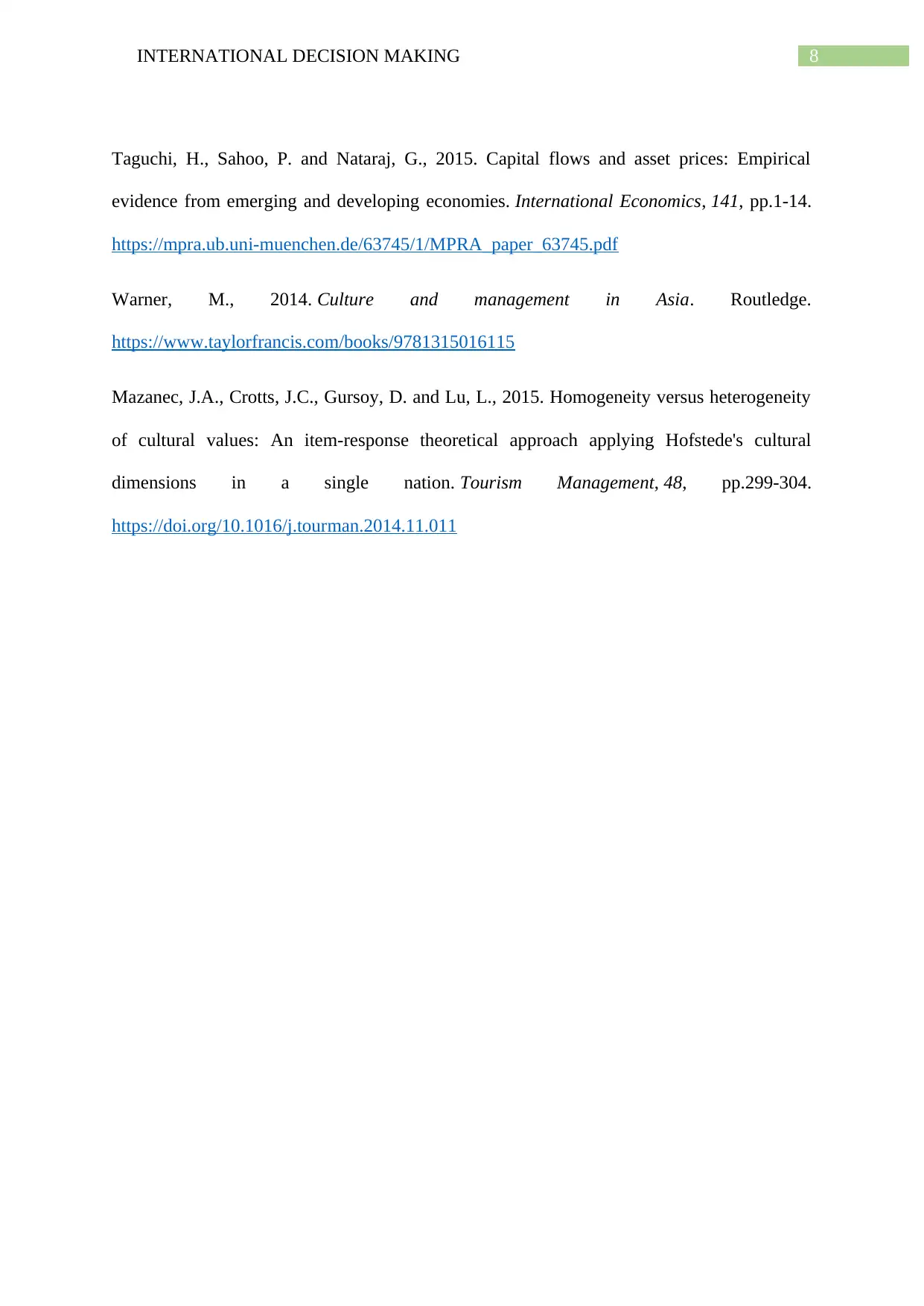
8INTERNATIONAL DECISION MAKING
Taguchi, H., Sahoo, P. and Nataraj, G., 2015. Capital flows and asset prices: Empirical
evidence from emerging and developing economies. International Economics, 141, pp.1-14.
https://mpra.ub.uni-muenchen.de/63745/1/MPRA_paper_63745.pdf
Warner, M., 2014. Culture and management in Asia. Routledge.
https://www.taylorfrancis.com/books/9781315016115
Mazanec, J.A., Crotts, J.C., Gursoy, D. and Lu, L., 2015. Homogeneity versus heterogeneity
of cultural values: An item-response theoretical approach applying Hofstede's cultural
dimensions in a single nation. Tourism Management, 48, pp.299-304.
https://doi.org/10.1016/j.tourman.2014.11.011
Taguchi, H., Sahoo, P. and Nataraj, G., 2015. Capital flows and asset prices: Empirical
evidence from emerging and developing economies. International Economics, 141, pp.1-14.
https://mpra.ub.uni-muenchen.de/63745/1/MPRA_paper_63745.pdf
Warner, M., 2014. Culture and management in Asia. Routledge.
https://www.taylorfrancis.com/books/9781315016115
Mazanec, J.A., Crotts, J.C., Gursoy, D. and Lu, L., 2015. Homogeneity versus heterogeneity
of cultural values: An item-response theoretical approach applying Hofstede's cultural
dimensions in a single nation. Tourism Management, 48, pp.299-304.
https://doi.org/10.1016/j.tourman.2014.11.011
⊘ This is a preview!⊘
Do you want full access?
Subscribe today to unlock all pages.

Trusted by 1+ million students worldwide
1 out of 9
Related Documents
Your All-in-One AI-Powered Toolkit for Academic Success.
+13062052269
info@desklib.com
Available 24*7 on WhatsApp / Email
![[object Object]](/_next/static/media/star-bottom.7253800d.svg)
Unlock your academic potential
Copyright © 2020–2025 A2Z Services. All Rights Reserved. Developed and managed by ZUCOL.





